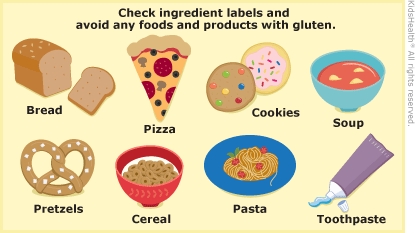When kids have celiac disease, gluten causes inflammation that damages the lining of the small intestines. This can lead to diarrhea or constipation, bloating, belly pain, weight loss, and other problems. Kids with celiac (SEE-lee-ak) disease have trouble absorbing important nutrients from food. The treatment for celiac disease is to avoid all foods and drinks that contain gluten.



Your child:

Your child:

How is celiac disease diagnosed? If a child has diarrhea, bloating, and weight loss, health care providers might test for celiac disease. A child with a close relative who has celiac disease also might be tested. Testing usually starts with blood tests for antibodies to gluten. If the antibodies are high, doctors will do a procedure called an endoscopy to take a small sample of the inside of the small intestine and send it for testing.
Will my child always need to be on a gluten-free diet? Yes. Anyone with celiac disease needs to be gluten-free for life. Even if the symptoms of celiac disease get better, eating gluten again will keep damaging the intestines. Sticking to a gluten-free diet can help prevent problems, like anemia (too few red blood cells) and osteoporosis (weak bones). A dietitian can help you find safe foods that your child likes to eat while making sure that your child's gluten-free diet is well-balanced.
How else can I help my child? You and your child can get help and support from celiac organizations like the Celiac Disease Foundation and the National Celiac Association. They also can help you connect with other families dealing with celiac disease.